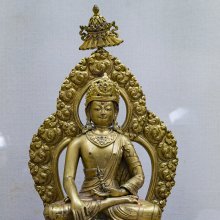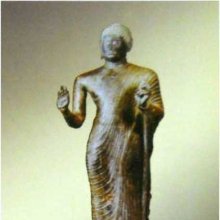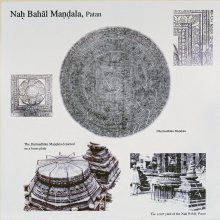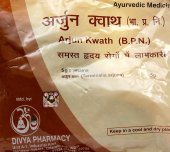Na, Ṅa, Ña, Ñā, Ṇ, Ṉ, Ṉa, Ṉā: 20 definitions
Introduction:
Na means something in Buddhism, Pali, Hinduism, Sanskrit, the history of ancient India, Marathi, Jainism, Prakrit, Hindi, biology, Tamil. If you want to know the exact meaning, history, etymology or English translation of this term then check out the descriptions on this page. Add your comment or reference to a book if you want to contribute to this summary article.
Images (photo gallery)
(+49 more images available)
In Hinduism
Vyakarana (Sanskrit grammar)
Source: Wikisource: A dictionary of Sanskrit grammar1) Ṅa (ङ).—Fifth consonant of the guttural class of consonants which is a nasal (अनुनासिक (anunāsika)) consonant; the vowel अ (a) being added at the end for facility of pronunciation; cf. T. Pr. I.21;
2) Ṅa.—A conventional term used for all the nasal consonants in the Jainendra Vyakarana.
--- OR ---
Ña (ञ).—tad. affix अ; cf. P. IV. 2. 58, 106, 107 and IV.4.129.
--- OR ---
1) Ṇa (ण).—Krt affix अ (a), added optionally to the roots headed by ज्वल् (jval) and ending with कस् (kas) in the first conjugation (see ज्वलिति (jvaliti) above) in the sense of agent, and necessarily to the root श्यै (śyai), roots ending with आ (ā) and the roots व्यध्, आस्रु, संस्रु, इ (vyadh, āsru, saṃsru, i) with अति, सो (ati, so) with अव, हृ (ava, hṛ) with अव, लिह्, श्लिष् (ava, lih, śliṣ) and श्वस् (śvas), to the roots दु (du) and नी (nī) without any prefix and optionally to ग्रह्ः (grahḥ) e. g. ज्वालः (jvālaḥ) or ज्वलः, अवश्यायः, दायः, धायः, व्याधः, आस्त्रावः, संस्त्रवः, अत्यायः, अवसायः, अवहारः, लेहः, श्लेषः, श्वासः, दावः, नायः, ग्रहः (jvalaḥ, avaśyāyaḥ, dāyaḥ, dhāyaḥ, vyādhaḥ, āstrāvaḥ, saṃstravaḥ, atyāyaḥ, avasāyaḥ, avahāraḥ, lehaḥ, śleṣaḥ, śvāsaḥ, dāvaḥ, nāyaḥ, grahaḥ) or ग्राहःः (grāhaḥḥ) ; in the case of the root ग्रह् (grah) the affix ण (ṇa) is applied by ब्यवस्थितविभाषा (byavasthitavibhāṣā), the word ग्रहः (grahaḥ) meaning a planet and the word ग्राहः (grāhaḥ) meaning a crocodile; cf Kas. on P. III. 1.140-143;
2) Ṇa.—Krt affix अ (a) in the sense of verbal activity (भाव (bhāva)) applied along with the affix अप् (ap) to the root अद् (ad) with नि (ni); e.g.न्यादः निघसः (nyādaḥ nighasaḥ); cf. P. III.3.60;
3) Ṇa.—Krt affix ण (ṇa) prescribed by the Varttikakara after the roots तन्, शील् (tan, śīl). काम, भक्ष् (kāma, bhakṣ) and चर् (car) with आ; cf. P.III.1.140 Vart 1, and III. 2.l Vart. 7;
4) Ṇa.—tad. affix अ (a) in the sense of अपत्य (apatya) added along with टक् (ṭak) also, to a word referring to a female descendant (गेीत्रस्त्री (geीtrastrī)) if the resultant word indicates censure ; e. g. गार्भ्यः गार्गिकः (gārbhyaḥ gārgikaḥ) cf. P. IV.1.147, 150;
5) Ṇa.—tad. affix अ (a) in the sense of अपत्य (apatya) added also with the affix फिञ् (phiñ), to the word फाण्टाहृतिः (phāṇṭāhṛtiḥ)
6) Ṇa.—tad. affix अ (a) in the sense of 'a game' added to a word meaning 'an instrument in the game'; e.g. दाण्डा, मौष्टाः (dāṇḍā, mauṣṭāḥ) cf. P. IV.2.57: {7) tad. affix अ (a) added to the word छत्त्र (chattra) and others in the sense of 'habituated to' e.g. छात्रः, शैक्षः, पौरोहः चौरः (chātraḥ, śaikṣaḥ, paurohaḥ cauraḥ): cf. P.IV. 4.62:
8) Ṇa.—tad. affix अ (a) added to the words अन्न, भक्त, सर्व, पथिन्, यथाकथाच, प्रज्ञा, श्रद्धा, अर्चा, वृत्तिं (anna, bhakta, sarva, pathin, yathākathāca, prajñā, śraddhā, arcā, vṛttiṃ) and अरण्य (araṇya) in the senses specified with respect to each ; e.g. आन्नः (ānnaḥ) (मनुष्यः (manuṣyaḥ)) भाक्तः (bhāktaḥ) (शालिः (śāliḥ)), सार्वे (sārve) (सर्वस्मै हितम् (sarvasmai hitam)), पान्थः, याथाकथाचं (pānthaḥ, yāthākathācaṃ) (कार्यम् (kāryam)), प्राज्ञः (prājñaḥ) or प्रज्ञावान्, श्राद्धः (prajñāvān, śrāddhaḥ) or श्रद्धावान्, आर्चः (śraddhāvān, ārcaḥ) or अर्चावान्, घार्त्तः (arcāvān, ghārttaḥ) or वृत्तिमान् (vṛttimān) and आरण्याः (āraṇyāḥ) (सुमनसः (sumanasaḥ)); cf. Kas. on P.IV. 4.85, 100, V.1.10, 76, 98, V.2.101 and IV.2.104 Varttika.
--- OR ---
Na (न).—(l) the consonant न् (n) (see न् (n) above) with the vowel added to it for facility of utterance, cf. T. Pr. I. 21 ; (2) tad. affix न (na) added to words headed by पामन् (pāman) in the sense of possession; e.g. पामनः, हेमनः (pāmanaḥ, hemanaḥ) etc., cf P. V. 2.100; (3) tad. affix न (na) as found in the word ज्योत्स्ना (jyotsnā) derived from ज्योतिष् (jyotiṣ), cf P. V. 2.114; (4) unadi affix न (na) as found in the word स्योनः (syonaḥ); cf Kas. on P. VI.4.19; (5) the krt affix नङ् (naṅ) as also नन् (nan) prescribed after the roots यज्, याच्, यत्, विच्छ्, प्रच्छ्, रक्ष् (yaj, yāc, yat, vicch, pracch, rakṣ) and स्वप् (svap), e g. यज्ञः, याञ्चा, प्रश्नः (yajñaḥ, yāñcā, praśnaḥ) etc., cf P. III. 3.90, 91; (6) the negative particle न (na) given by Panini as नञ् (nañ) and referred to in the same way, which (i.e. न.) when compounded with a following word is changed into अ (a) or अन् (an) or retained in rare cases as for instance in नभ्राट्, नासत्यौ, नक्षत्रम् (nabhrāṭ, nāsatyau, nakṣatram) etc. cf P. VI.3.73-75;(7) tad.affix न (na) (नञ् (nañ)) applied to the words स्त्री (strī) and पुंस् (puṃs) in senses given from P. IV. 1.92 to V. 2.1 e. g. स्त्रैणं, पौंस्नम् (straiṇaṃ, pauṃsnam) cf. IV. 1.87.
--- OR ---
1) Nā (ना).—tad. affix ना (nā) as also नाञ् (nāñ) prescribed respectively after वि (vi) and नञ् (nañ) (negative particle न) in the sense of separation; e. g. विना, नाना (vinā, nānā) ;
2) Nā.—Case ending ना (nā) substituted for the ins. sing. affix टा (ṭā) (called also आङ् (āṅ) in ancient grammars) in the masculine gender after words called घि (ghi) i. e. words ending in इ (i) or उ (u) excepting such as are called नदी (nadī).

Vyakarana (व्याकरण, vyākaraṇa) refers to Sanskrit grammar and represents one of the six additional sciences (vedanga) to be studied along with the Vedas. Vyakarana concerns itself with the rules of Sanskrit grammar and linguistic analysis in order to establish the correct context of words and sentences.
Purana and Itihasa (epic history)
Source: archive.org: Puranic EncyclopediaNa (न).—In Agni Purāṇa, Chapter 348, the meaning of this syllable is given as 'vṛnda' (collection) and 'Buddha'

The Purana (पुराण, purāṇas) refers to Sanskrit literature preserving ancient India’s vast cultural history, including historical legends, religious ceremonies, various arts and sciences. The eighteen mahapuranas total over 400,000 shlokas (metrical couplets) and date to at least several centuries BCE.
In Buddhism
Theravada (major branch of Buddhism)
Source: Journey to Nibbana: Patthana DhamaNa means no, none, nothing.
Theravāda is a major branch of Buddhism having the the Pali canon (tipitaka) as their canonical literature, which includes the vinaya-pitaka (monastic rules), the sutta-pitaka (Buddhist sermons) and the abhidhamma-pitaka (philosophy and psychology).
Tibetan Buddhism (Vajrayana or tantric Buddhism)
Source: academia.edu: A Critical Study of the Vajraḍākamahātantrarāja (II)Na (न) is the name of a Vākchomā (‘verbal secrect sign’) which has its meaning defined as ‘nara’ according to chapter 8 of the 9th-century Vajraḍākamahātantrarāja, a scripture belonging to the Buddhist Cakrasaṃvara (or Saṃvara) scriptural cycle. These Vākchomās (viz., na) are meant for verbal communication and can be regarded as popular signs, since they can be found in the three biggest works of the Cakrasaṃvara literature.

Tibetan Buddhism includes schools such as Nyingma, Kadampa, Kagyu and Gelug. Their primary canon of literature is divided in two broad categories: The Kangyur, which consists of Buddha’s words, and the Tengyur, which includes commentaries from various sources. Esotericism and tantra techniques (vajrayāna) are collected indepently.
India history and geography
Source: Cologne Digital Sanskrit Dictionaries: Indian Epigraphical GlossaryNā.—cf. nā-bhū. Note: nā is defined in the “Indian epigraphical glossary” as it can be found on ancient inscriptions commonly written in Sanskrit, Prakrit or Dravidian languages.
--- OR ---
Nā.—ḻi (EI 9, 28), a grain measure; same as nālikā. Note: nā is defined in the “Indian epigraphical glossary” as it can be found on ancient inscriptions commonly written in Sanskrit, Prakrit or Dravidian languages.
See also (synonyms): Nāḻi.

The history of India traces the identification of countries, villages, towns and other regions of India, as well as mythology, zoology, royal dynasties, rulers, tribes, local festivities and traditions and regional languages. Ancient India enjoyed religious freedom and encourages the path of Dharma, a concept common to Buddhism, Hinduism, and Jainism.
Biology (plants and animals)
Source: Google Books: CRC World Dictionary (Regional names)1) Na in Ivory Coast is the name of a plant defined with Cola acuminata in various botanical sources. This page contains potential references in Ayurveda, modern medicine, and other folk traditions or local practices It has the synonym Edwardia acuminata (P. Beauv.) Kuntze (among others).
2) Na in Sierra Leone is also identified with Pennisetum purpureum It has the synonym Gymnothrix nitens Andersson (etc.).
Example references for further research on medicinal uses or toxicity (see latin names for full list):
· Bulletin of Miscellaneous Information Kew (1933)
· Grasses of Burma (1960)
· Kongel. Danske Vidensk. Selsk. Naturvidensk. Math. Afh. (1828)
· Beskrivelse af Guineiske Planter
· Journal of Ethnopharmacology (1986)
· Meletemata Botanica (1832)
If you are looking for specific details regarding Na, for example health benefits, side effects, pregnancy safety, chemical composition, diet and recipes, extract dosage, have a look at these references.

This sections includes definitions from the five kingdoms of living things: Animals, Plants, Fungi, Protists and Monera. It will include both the official binomial nomenclature (scientific names usually in Latin) as well as regional spellings and variants.
Languages of India and abroad
Marathi-English dictionary
Source: DDSA: The Molesworth Marathi and English Dictionaryṇa (ण).—The fifteenth consonant. It is sounded more nasally than the English N. It is represented here, when the Roman character is used, by n̤. Except as in the particle ṇēṃ & pl ṇīṃ, for which see the preferable form nēṃ & nīṃ, it never occurs initially.
--- OR ---
na (न).—n The twentieth consonant. It corresponds with N.
--- OR ---
na (न).—n ad No, not, nor. 2 conj It often appears betwixt the two members of a reduplication, coupling them, and answering to By, with, after. Ex. paiśānapaisā-rupayānarupayā-damaḍīnadamaḍī (jathatō- miḷavitō-kharacatō) He gathers, spends &c. money, penny by penny, rupee by rupee. jhāḍānajhāḍa- gharānaghara (ṭipata jā); pāyarīnapāyarī; (caḍhata jā);pāva- lānapāūla (sarakata gēlā); māgānamāga (cōrācā śōdha lāvalā); divasānadivasa-varṣānavarṣa &c. 3 conj (Con- tracted from āṇi through nī) And. Ex. ghāḍāna baila, ḍhālana taravāra, tōna mī. Note. In pronunciation the na is considered, not as separate, but as attached to the word occurring first. Ex. Ghoṛan byl, dhalan tarwar, ton mi. 4 na often has the sense of nakō dont; as na yāla tara na yā, na dyāla tara na dyā If you wont come, dont come &c. nacā pāḍā or phāḍā The chapter of na or No. Ex. nacā phāḍā vācaṇēṃ-sāṅgaṇēṃ-ghaṭa karaṇēṃ-ghōkaṇēṃ To refuse or deny everything; to be ever no-no-ing. hyālā nacā phāḍā pāṭha āhē He says No to everything.
--- OR ---
nā (ना).—ind A disjunctive particle, Nor; bearing a privative power upon both members disjoined. Ex. gāṃvānta ghara nā rānānta śēta, bāpa nā māya, divasa nā rātra, barā nā vāīṭa. 2 It occurs significantly as a disjunctive between numerous adverbs and pronouns reduplicated, Not, i. e. if not (that) then (this). Ex. kāṃhīṃ nā kāṃhīṃ Something or other, or some; some quantity more or less, great or little: kōṇhī nā kōṇhī Some one; some person or other: kadhīṃ nā kadhīṃ Sometimes, or sometime; at some time or other: kasā nā kasā, kēvhāṃ nā kēvhāṃ, kōṭhūna nā kōṭhūna, ēka nā ēka &c. 3 An adverb of negation, Not. Ex. tō dēīnā, yēīnā, ghēīnā. 4 A particle emphatically concluding an interrogation, or an affirmation of the interrogative form; implying surprise at some supposition which has called it forth. Ex. tū yētōsanā, dētōsanā? You are coming an't you? you mean to give, don't you? mī jātōnnā, vācatōṃ- nā I am going, reading &c., am I not? 5 A redundant particle occurring after the present participle. Ex. asatānā, khātānā, basatānā, uṭhatānā. Note. In rājāpūraprānta nā in this construction is negative: khātānā, basatānā, uṭhatānā therefore signify Without eating, sitting, rising. As redundant, or rather as emphatic, nā occurs also after the adverb of time; as ēvhānā, tēvhānā, kēvhānā Just at this moment, just then &c. 6 (Formed orally from the resemblance of sound in āṃlā or yāṃlā & ānā or yānā; but now used also in writing.) An affix to nouns and pronouns in the acc. and dat. cases plural. Ex. jhāḍānā, tyānā, for jhāḍāṃlā, tyāṃlā. 7 (From the Persian ) A particle of negation prefixed not only to words from the Persian, but generally. Ex. nākhūśa, nāpasanta, nāpikalēṃ, nāpīka, nāpērā. 8 Used as s f Negativing or no-ing. v kara, mhaṇa, bōla; and nā nā-karaṇēṃ-mhaṇaṇēṃ &c. To deny or refuse often or much.
Source: DDSA: The Aryabhusan school dictionary, Marathi-Englishṇa (ण).—m (-
--- OR ---
ṇā (णा).—n -
--- OR ---
ṇā (णा).—n -
--- OR ---
nā (ना).—or -
--- OR ---
na (न).—The twentieth consonant.
--- OR ---
na (न).—ad No, not, nor. conj By, with, after. Ex. paisānapaisā, jhāḍanajhāṅa. nacā pāḍā or phāḍā The chapter of na or No. nacāphāḍā vācaṇēṃ sāṅgaṇēṃ-ghaṭa karaṇēṃ-ghōkaṇēṃ To refuse or deny everything. hālā nacā phāḍā pāṭha āhē. He says No to everything.
--- OR ---
nā (ना).—ind A disjunctive particle, Nor. It occurs significantly as a disjunctive between numerous adverbs and pro- nouns reduplicated. Not, i. e. if not (that) then (this) Ex. kāṃhīṃ nā kāṃhīṃ Something or other, or some; some quantity more or less, great or little; kōṇhī nā kōṇhī Some one; some person or other; kadhīṃ nā kadhīṃ Sometimes, at some time or other; kasā nā kasā, kēvhāṃ nā kēvhāṃ, kōṭhūna nā kōṭhūna, ēka nā ēka &c. An adverb of negation, Not Ex. tō dēīnā, yēīnā, ghēīnā. A particle emphatically con- cluding an interrogation, or an affirmation of the interrogative form.
--- OR ---
na (न).—or-
--- OR ---
na (न).—or-
--- OR ---
nā (ना).—or-
--- OR ---
ṇā (णा).—or-
--- OR ---
nā (ना).—or-
--- OR ---
nā (ना).—or-
--- OR ---
na (न).—or-
Marathi is an Indo-European language having over 70 million native speakers people in (predominantly) Maharashtra India. Marathi, like many other Indo-Aryan languages, evolved from early forms of Prakrit, which itself is a subset of Sanskrit, one of the most ancient languages of the world.
Sanskrit dictionary
Source: DDSA: The practical Sanskrit-English dictionaryṄa (ङ).—No word in general use begin with this letter.
--- OR ---
Ṅa (ङ).—
1) An object of sense.
2) Desire, wish.
3) An epithet of Śiva; ङः प्राणस्तुरगो ङा धरा रमा (ṅaḥ prāṇasturago ṅā dharā ramā) and ङं वितानं (ṅaṃ vitānaṃ)
Derivable forms: ṅaḥ (ङः).
--- OR ---
Ña (ञ).—
1) Singer.
2) Gurgling sound.
3) Bull.
4) Name of Śukra.
5) Perversity.
6) Number
Derivable forms: ñaḥ (ञः).
--- OR ---
Ṇa (ण).—[There are hardly any words in real use in Sanskrit beginning with ṇa. Many roots which, in the Dhātupāṭha, are written with an initial ṇa really begin with na. They are so written to show that the na is liable to be changed to ṇa when preceded by prepositions, like pra, pari, antar &c.]
--- OR ---
Ṇa (ण).—
1) Knowledge.
2) Certainty, ascertainment.
3) An ornament.
4) A water or summer-house.
5) A bad man.
6) Śiva.
7) The sound of negation.
8) Gift, giving.
Derivable forms: ṇaḥ (णः).
--- OR ---
Na (न).—a. Thin, spare.
2) Vacant, empty.
3) Same, identical.
4) Unwearied.
5) Praised.
6) Undivided.
-naḥ 1 A pearl.
2) Name of Gaṇeśa.
3) Wealth, prosperity.
4) A band, tie.
5) War.
6) Name of Buddha.
7) A gift. -ind. (a) A particle of negation equivalent to 'not', 'no', 'nor', 'neither', and used in wishing, requesting, or commanding, but not in prohibition before the imperative mood. (b) Used with the potential mood न (na) may sometimes have the force of 'lest', 'for fear lest', 'that not'; क्षत्रियैर्धार्यते शस्त्रं नार्तशब्दो भवेदिति (kṣatriyairdhāryate śastraṃ nārtaśabdo bhavediti) Rām. (c) In agrumentative writings न (na) often comes after इति चेत् (iti cet) and means 'not so.' (d) When a negative has to be repeated in successive clauses of the same sentence or in different sentences, न (na) may be simply repeated or may be used with particles like उत, च, अपि, चापि, वा (uta, ca, api, cāpi, vā) &c.; नाधीयीताश्वमारूढो न वृक्षं न च हस्तिनम् । न नावं न खरं नोष्ट्रं नेरिणत्थो न यानगः (nādhīyītāśvamārūḍho na vṛkṣaṃ na ca hastinam | na nāvaṃ na kharaṃ noṣṭraṃ neriṇattho na yānagaḥ) || Manusmṛti 4.12; प्रविशन्तं न मां कश्चिदपश्यन्नाप्यवारयत् (praviśantaṃ na māṃ kaścidapaśyannāpyavārayat) Mb.; Manusmṛti 2.195; 3.8,9;4.15; न वा शरच्चन्द्रमरीचिकोमलं मृणालसूत्रं रचितं स्तनान्तरे (na vā śaraccandramarīcikomalaṃ mṛṇālasūtraṃ racitaṃ stanāntare) Ś.16.17. Sometimes न (na) may not be expressed in the second and other clauses, but represented only by च, वा, अपि वा (ca, vā, api vā); संपदि यस्य न हर्षो विपदि विषादो रणे च धीरत्वम् (saṃpadi yasya na harṣo vipadi viṣādo raṇe ca dhīratvam) Pañcatantra (Bombay) 2.175. (c) न (na) is frequently joined with a second न (na) or any other negative particle to intensify or emphasize an assertion; प्रत्युवाच तमृषिर्न तत्त्वतस्त्वां न वेद्मि पुरुषं पुरातनम् (pratyuvāca tamṛṣirna tattvatastvāṃ na vedmi puruṣaṃ purātanam) R. 11.85; न च न परिचितो न चाप्यगम्यः (na ca na paricito na cāpyagamyaḥ) M.1.11; न पुनरलंकार- श्रियं न पुष्यति (na punaralaṃkāra- śriyaṃ na puṣyati) Ś1.19/2; नादण्ड्यो नाम राज्ञोऽस्ति (nādaṇḍyo nāma rājño'sti) Manusmṛti 8.335; Meghadūta 65,18; नासो न काम्यो न च वेद सम्यग् द्रष्टुं न सा (nāso na kāmyo na ca veda samyag draṣṭuṃ na sā) R. 6.3; Śiśupālavadha 1.55; Ve.2.1. (f) In a few cases न (na) is retained at the beginning of a negative Tatpuruṣa compound; as नाक, नासत्य, नकुल (nāka, nāsatya, nakula); see P.VI.3.75. (g) न (na) is often joined with other particles; नच, नवा, नैव, नतु, न चेद्, न खलु (naca, navā, naiva, natu, na ced, na khalu) &c. (h) It is also used, especially in early Vedic literature, in the sense of 'like', 'as', 'as it were'; यद्वां नरा सनये दंस उग्रमाविष्कृणोमि तन्यतुर्न वृष्टिम् (yadvāṃ narā sanaye daṃsa ugramāviṣkṛṇomi tanyaturna vṛṣṭim) Bṛ. Up.2.5.16; गावो न गव्यूतीरनु (gāvo na gavyūtīranu); Śiśupālavadha 2.4. (v. l.)
--- OR ---
Na (न).—1 P., sometimes Ā. (namati-te, nanāma, anaṃsīt, naṃsyati, nata, caus. namayati-te or nāmayati-te, but with a preposition namayati only; desid. ninaṃsati) also 9 P. (namnāti), 4. P. (namyati)
1) To bow to, make obeisance to, salute (as a mark of respect) (with acc. or dat.); इयं नमति वः सर्वान् त्रिलोचनवधूरिति (iyaṃ namati vaḥ sarvān trilocanavadhūriti) Kumārasambhava 6.89; Bhagavadgītā (Bombay) 11.37; Bhaṭṭikāvya 9.51;1.31; 12.99; Si.4.57.
2) To submit or subject oneself, bow down; अशक्तः सन्धिमान् नमेत् (aśaktaḥ sandhimān namet) Kām.8.55.
3) To bend, sink; go down; अनंसीद्भूर्भरेणास्य (anaṃsīdbhūrbhareṇāsya) Bhaṭṭikāvya 15.25; नेमुः सर्वदिशः (nemuḥ sarvadiśaḥ) K.55; उन्नमति नमति वर्षति (unnamati namati varṣati)......मेघः (meghaḥ) Mṛcchakaṭika 5.26.
4) To stoop, be inclined.
5) To be bent or curved.
6) To sound.
7) To change a dental to a lingual letter. -Caus.
1) To bend, make curved.
2) To bend (as a bow); न नमयितुमधिज्यमस्मि शक्तः (na namayitumadhijyamasmi śaktaḥ) Ś.2.3.
3) To cause to sink.
4) To prevent, ward off.
5) To subdue, make subordinate; स पुरस्कृतमध्यमक्रमो नमयामास नृपाननुद्धरन् (sa puraskṛtamadhyamakramo namayāmāsa nṛpānanuddharan) R.8.9.
Derivable forms: nam (नम्).
--- OR ---
Nā (ना).—No, not. (= na q. v.).
Source: Cologne Digital Sanskrit Dictionaries: Shabda-Sagara Sanskrit-English DictionaryṄa (ङ).—The fifth consonant of the Sanskrit alphabet, and the nasal of the first class; the sound of this letter corresponds with that of the nasal N in Song, &c. or in the French word bon.
--- OR ---
Ṅa (ङ).—m.
(-ṅaḥ) 1. An object of sense. 2. Desire, wish for any sensual object. E. ṅu to sound, affix. ḍa . viṣaye viṣayaspṛ hāyāṃ bhairave ca .
--- OR ---
Ña (ञ).—The nasal attached to the class of palatal letters, having something like the sound of N in the French word Singe, and expressed by the letter accented N.
--- OR ---
Ña (ञ).—m.
(-ñaḥ) 1. A name of Sukra, regent of Venus. 2. An ox. 3. A heretic, an apostate. 4. Singing. 5. Jingling or inarticulate sound. ṭa
--- OR ---
Ṇa (ण).—The nasal N belonging to the third or cerebral class of consonants; in derivation and inflection this is usually changed to na or to dental N, and hence the derivatives from the following redicals occur under that letter.
--- OR ---
Ṇa (ण).—m.
(-ṇaḥ) 1. Knowledge. 2. Certainty, ascertainment. 3. A name of Siva. 4. Vindudeva, said to be a A Jaina deity. 5. An ornament. 6. A water or summer house. 7. One without good qualities. 8. A kind of sound, the sound of nagation. 9. Gift, giving. E. ṇī to guide, &c. affix ḍa.
--- OR ---
Na (न).—The twentieth consonant of the Deva Nagri Alphabet, corresponding with the letter N.
--- OR ---
Na (न).—mfn.
(-naḥ-nā-naṃ) 1. Thin, spare. 2. Vacant, empty. 3. Identical, same, like. 4. Unvexed, unwearied 5. Undivided, unbroken. m. (naḥ) 1. A Baudd'ha, a follower of Budd'ha. 2. Binding, tying. 3. One who is praised. 4. A name of Ganesa. 5. War. 6. Giving, a gift. 7. Good, welfare, prosperity. 8. A jewel. f. (nā) 1. The navel. 2. A musical instrument. 3. Knowledge. ind. 1. No, not, a particle of prohibition. 2. A particle of comparison. 3. A particle of negation, annihilation, &c. E. nī to obtain, or nah to bind, &c. ḍa aff.
--- OR ---
Nā (ना).—ind. No, not (another form of na .)
Source: Cologne Digital Sanskrit Dictionaries: Benfey Sanskrit-English DictionaryNa (न).—a particle, 1. Not, Mahābhārata 3, 362. 2. When repeated in the same sentence it implies a very strong affirmation, Absolutely, [Arjunasamāgama] 10, 17. 3. Lest (with a potential), [Rāmāyaṇa] 2, 63, 41. 4. Often in the beginning of comp. words, e. g. nātidūra, i. e. na-ati-dūra, adj. Not very distant, [Hiḍimbavadha] 1, 51. 5. ved. Like, just as,
— Cf. [Gothic.] ne, nei; A. S. ná; [Old High German.] ni; [Latin] ne in nonne;
Source: Cologne Digital Sanskrit Dictionaries: Cappeller Sanskrit-English DictionaryNa (न).—1. [pronoun] stem. of 1^st [person or personal] [dual] & [plural]
--- OR ---
Na (न).—2. ([indeclinable]) not (also °— = 2 a), nor, neither (±u, uta, api, cāpi, vā, atha vā); no ([absolutely]); lest ([with] [optative]); like, as (only in [adjective] l.). In the negat. mgs often followed by eva & khalu. Two negations in the same sentence generally form an emphatic affirmation. — Cf. khalu, ced, tu, nahi, no.
--- OR ---
Nā (ना).—[adverb] not ( = 2 na).
Source: Cologne Digital Sanskrit Dictionaries: Monier-Williams Sanskrit-English Dictionary1) Ṅa (ङ):—1. ṅa the 5th consonant of the Sanskṛt alphabet, nasal of the 1st class. No word in use begins with this letter
2) it is usually found as the 1st member of a conjunct consonant preceded by a vowel.
3) 2. ṅa m. an object of sense, [cf. Lexicographers, esp. such as amarasiṃha, halāyudha, hemacandra, etc.]
4) desire for any sensual object, [cf. Lexicographers, esp. such as amarasiṃha, halāyudha, hemacandra, etc.]
5) Śiva (bhairava), [cf. Lexicographers, esp. such as amarasiṃha, halāyudha, hemacandra, etc.]
6) Ña (ञ):—1. ña the palatal nasal (found before palatal consonants).
7) 2. ña m. a singer, [cf. Lexicographers, esp. such as amarasiṃha, halāyudha, hemacandra, etc.]
8) a jingling sound, [cf. Lexicographers, esp. such as amarasiṃha, halāyudha, hemacandra, etc.]
9) a heretic, [cf. Lexicographers, esp. such as amarasiṃha, halāyudha, hemacandra, etc.]
10) an ox, [cf. Lexicographers, esp. such as amarasiṃha, halāyudha, hemacandra, etc.]
11) the planet Śukra, [cf. Lexicographers, esp. such as amarasiṃha, halāyudha, hemacandra, etc.]
12) Ṇa (ण):—1. ṇa the cerebral nasal, [Taittirīya-prātiśākhya xxi, 14.]
13) 2. ṇa m. knowledge, [cf. Lexicographers, esp. such as amarasiṃha, halāyudha, hemacandra, etc.]
14) certainty, ascertainment, [cf. Lexicographers, esp. such as amarasiṃha, halāyudha, hemacandra, etc.]
15) ornament, [cf. Lexicographers, esp. such as amarasiṃha, halāyudha, hemacandra, etc.]
16) a water-house, [cf. Lexicographers, esp. such as amarasiṃha, halāyudha, hemacandra, etc.]
17) = nirvṛti (invented for the etymology of kriṣṇa,), [Mahābhārata v, 70, 5 [Scholiast or Commentator]]
18) a bad man, [cf. Lexicographers, esp. such as amarasiṃha, halāyudha, hemacandra, etc.]
19) Name of Śiva or of a, [Buddhist literature] deity, [cf. Lexicographers, esp. such as amarasiṃha, halāyudha, hemacandra, etc.]
20) the sound of negation, [cf. Lexicographers, esp. such as amarasiṃha, halāyudha, hemacandra, etc.]
21) gift, [cf. Lexicographers, esp. such as amarasiṃha, halāyudha, hemacandra, etc.]
22) Na (न):—1. na the dental nasal (found at the beginning of words and before or after dental consonants as well as between vowels; subject to conversion into ṇa, [Pāṇini 8-4, 1-39]).
23) 2. na ind. not, no, nor, neither, [Ṛg-veda] (nā, [x, 34, 8]) etc. etc. (as well in simple negation as in wishing, requesting and commanding, except in prohibition before an [imperative] or an augmentless [Aorist] cf. a. mā; in successive sentences or clauses either simply repeated e.g. [Manu-smṛti iv, 34]; or strengthened by another particle, [especially] at the second place or further on in the sentence e.g. by u cf. no, uta, api, cāpi, vā, vāpi or atha vā, [Ṛg-veda i, 170, 1; 151, 9; Nalopākhyāna iii, 24, etc.]; it may even be replaced by ca, vā, api ca, api vā, etc. alone, as, [Manu-smṛti ii, 98; Nalopākhyāna i, 14, etc.]; often joined with other particles, beside those mentioned above [especially] with a following tu, tv eva, tv eva tu, ced q.v., khalu q.v., ha cf. [gana] cādi and, [Pāṇini 8-1, 31] etc.; before round or collective numbers and after any numeral in the [instrumental case] or [ablative] it expresses deficiency e.g. ekayā na viṃśati, not 20 by 1 id est. 19 [Śatapatha-brāhmaṇa]; pañcabhir na catvāri śatāni, 395 [ib.]; with another na or an a [privative] it generally forms a strong affirmation cf. [Vāmana’s Kāvyālaṃkāravṛtti v, 1, 9] e.g. neyaṃ na vakṣyati, she will most certainly declare, [Śakuntalā iii, 9]; nādaṇḍyo sti, he must certainly be punished, [Manu-smṛti viii, 335]; it may also, like a, form compounds, [Vāmana’s Kāvyālaṃkāravṛtti v, 2, 13] cf. below)
24) that not, lest, for fear lest (with [Potential]), [Mahābhārata; Rāmāyaṇa; Daśakumāra-carita etc.]
25) like, as, as it were (only in Veda and later artificial language, e.g. gauro na tṛṣitaḥ piba, drink like [lit. ‘not’ id est. ‘although not being’] a thirsty deer; in this sense it does not coalesce metrically with a following vowel).
26) cf. [Greek] νη-; [Latin] nĕ-; [Anglo-Saxon] ne, ‘not’; [English] no, etc.
27) 3. na mfn. ([cf. Lexicographers, esp. such as amarasiṃha, halāyudha, hemacandra, etc.]) thin, spare
28) vacant, empty
29) identical
30) unvexed, unbroken
31) m. band, fetter
32) jewel, pearl
33) war
34) gift
35) welfare
36) Name of Buddha
37) Name of Gaṇeśa
38) = prastuta
39) = dviraṇḍa (?)
40) Nā (ना):—[from na] a f. the navel
41) [v.s. ...] a musical instrument
42) [v.s. ...] knowledge.
43) b See 2. na.
Source: Cologne Digital Sanskrit Dictionaries: Yates Sanskrit-English Dictionary1) Ṅa (ङ):—ng. The nasal of the first class of consonants or gutturals.
2) (ṅaḥ) 1. m. An object of sense; wish, sensual desire.
3) Ña (ञ):—n The nasal of the second class.
4) (ñaḥ) 1. m. A name of Sukra regent of Venus; an ox; a heretic; singing; jingling.
5) Ṇa (ण):—ṇ The nasal of the lingual class.
6) (ṇaḥ) 1. m. Knowledge; certainty; Shiva; Vindudeva; ornament; a water or summer house; bad man; sound of negation; gift.
7) Na (न):—n The 16th consonant, the nasal of the 4th or dental class.
8) (naḥ) 1. m. A Bauddha; Ganesha; binding; war; a gift; praise. f. The navel. a. Thin, vacant, identical. adv. No, not.
9) Nā (ना):—adv. No.
[Sanskrit to German]
Sanskrit, also spelled संस्कृतम् (saṃskṛtam), is an ancient language of India commonly seen as the grandmother of the Indo-European language family (even English!). Closely allied with Prakrit and Pali, Sanskrit is more exhaustive in both grammar and terms and has the most extensive collection of literature in the world, greatly surpassing its sister-languages Greek and Latin.
Hindi dictionary
Source: DDSA: A practical Hindi-English dictionary1) Ṅa (ङ):——the fifth (and nasal) consonant and the ultimate member of the first pentad (i.e. [kavarga]) of the Devnagri alphabet. No word in use in Sanskrit or Hindi begins with this letter. It is usually found as a first member of a conjunct consonant preceded by a vowel but in reformed Devanagri: script, it has been replaced by a dot even in such cases (as [gaṃgā], and not [ganṅā], is the correct accepted form).
2) Ña (ञ) [Also spelled jya]:——the fifth and final (nasal) letter of the second pentad (i.e. [cavarga]) of the Devnagri: alphabet.
3) Ṇa (ण) [Also spelled n]:——the ultimate nasal letter of the third pentad (i.e. [ṭavarga]) of the Devnagri: alphabet.
4) Na (न):——the last letter of the fourth pentad (i.e. [tavarga]) of the Devnagri: alphabet; (ind.) no, not; a typical conversational particle used for laying emphasis or ascertaining the other person’s reaction (as [calo-; patra likhoge]— ?); isn't it!; -[to], — neither...nor; —[karanā] to say 'no', to refuse; to decline; to deny; —[āe kī khuśī na gae kā du:kha] if rich be not elected, if poor be not dejected; —[idhara —udhara] sitting on the fence; —[ghara kā —ghāṭa kā] neither fish nor fowl, neither here nor there; —[nau mana tela/sonā hogā —rādhā nācegī] if the sky falls, we shall gather larks; —[kucha se kucha bhalā] something is better than nothing, better are small fish than an empty dish; —[khāye —khāne de] dog in the manger; —[khudā hī milā —visāle sanama] he who hunts two hares leaves one and loses the other, like a donkey between two heaps of hay; —[jāye māṃdana na pāye raphtana] up a gum-tree, at the end of one’s wits; —[tītara —baṭera] neither fish/flesh nor fowl, neither hawk nor buzzard; —[bābā āyeṃ —ghaṃṭā bājai] no priest, no mass; —[rahegā bāṃsa —bajegī bāṃsurī] no root, no fruit; —[sāvana sūkhe —bhādoṃ hare] ever drunk ever dry.
5) Nā (ना):—(ind) a word denoting negation, no; ~[iṃsāpha] unjust; ~[iṃsāphī] injustice; ~[ittiphākī] disagreement; ~[ummīda] hopeless; disappointed, despaired; ~[ummīdī] hopelessness; disappointment, despair; ~[kadarā/kadra] a non-connoisseur, one who does not appreciate merit; ~[kadarī/~kadrī] non-appreciation, neglect, disregard; ~[kāphī] inadequate, insufficient; ~[kābila] unworthy; unqualified; incapable; undeserving, not fit for, not worth; ~[kābiliyata] incapability, inability; unworthiness; ~[kāma] fruitless, ineffective; disabled; unsuccessful; •[lauṭanā] to draw blank; ~[kāmayāba] unsuccessful; failed; ~[kāmayābī] failure; ~[kāmī] failure; ineffectiveness; ~[kārā] useless, worthless; unserviceable, good for nothing; a bad egg; idle; •[kara denā] to clip one’s wings, to make ineffective unserviceable; ~[kisa] inferior; wicked, worthless; defective; ~[khudā] see [nākhudā; ~khuśa] unhappy; displeased; annoyed; ~[khuśī] unhappiness, displeasure; annoyance; ~[khvāṃdā] illiterate, unlettered; ~[gavāra] intolerable, unbearable; •[gujaranā] to be unbearable; a sense of displeasure to be aroused; to feel offended; ~[gahānī] accident, accidental occurrence; ~[cākī] discord, estrangement, estranged feelings; ~[cīja] a small fry; worthless, insignificant, petty, trifling; ~[jāyaja] improper; undue; illegitimate; ~[tajarbekāra] inexperienced; a novice; ~[tajarbekārī] cack of experience; ~[tamāma] incomplete; ~[tavāṃ] feeble, weak; ~[tavānī] feebleness, weakness; ~[dāna] ignorant, stupid, nincompoop; •[kī dostī jī kā jaṃjāla] befriend a fool and suffer a thousand falls; [nādāna dosta se dānā duśmana acchā] better have a sensible foe than a foolish friend; ~[dānī] ignorance; stupidity; ~[dehaṃda] a habitual defaulter in due payment; -[nukara] roundabout denial; hesitant refusal; ~[pasaṃda] not likeable, not to one’s liking, repulsive; hence ~[pasaṃdagī]; ~[pāka] polluted; unholy; unchaste; uncouth; ~[pākī] pollutedness; unholiness; absence of chastity, uncouthness; ~[pāyadāra] not durable; not lasting; not firm or steady; ~[pāyadārī] lack or want of durability, temporariness; absence of firmness/steadiness; ~[paida] rare, scarce; ~[pharamāṃ] disobedient; defiant; ~[pharamānī] disobedience; defiance; ~[bāliga] minor, under-age; ~[bāligī] the state or condition of being minor/under-age, minority; ~[maṃjūra] rejected; disapproved; ~[maṃjūrī] disapproval; rejection; ~[marda] impotent, emasculate; coward; ~[mardī] impotence, emasculation; cowardice; ~[mākūla] unworthy, undeserving; unfit, improper; ~[mālūma] unknown, unidentified; ~[muāphika] unfavourable, unsuitable, not suited; ~[munāsiba] improper; undue; unbecoming; ~[mumakina] impossible; ~[murāda] frustrated, ill-fated; hence ~[murādī; ~meharabāna] unkindly, not favourably disposed; ~[maujūṃ] incompatible, not befitting; incongruous; ~[yāba] unique, rare; precious; hence ~[yābī; ~vākaphiyata] ignorance, the state of not being in know of, not knowing, not being apprised; ~[vākipha] not knowing, not apprised (of); ignorant; a stranger; hence ~[vākaphiyata; ~vājiba] improper, undue, not befitting; ~[śāda] unhappy, gloomy; ~[śukragujāra/~śukrā] ungrateful, thankless; ~[śukragujārī] ungratefulness, thanklessness; ~[sāja] indisposed; ~[sājī] indisposition; ~[hamavāra] uneven, rough and rugged.
...
Prakrit-English dictionary
Source: DDSA: Paia-sadda-mahannavo; a comprehensive Prakrit Hindi dictionary1) Na (न) in the Prakrit language is related to the Sanskrit word: Pada.
2) Ṇa (ण) also relates to the Sanskrit word: Tat.
3) Ṇa (ण) also relates to the Sanskrit word: Idam.
4) Ṇa (ण) also relates to the Sanskrit word: Jña.
5) Ṇā (णा) also relates to the Sanskrit word: Jñā.
Prakrit is an ancient language closely associated with both Pali and Sanskrit. Jain literature is often composed in this language or sub-dialects, such as the Agamas and their commentaries which are written in Ardhamagadhi and Maharashtri Prakrit. The earliest extant texts can be dated to as early as the 4th century BCE although core portions might be older.
Kannada-English dictionary
Source: Alar: Kannada-English corpusṄa (ಙ):—[noun] the nineteenth letter of Kannaḍa alphabet and the fifth consonant having nasal pronunciation.
--- OR ---
Ña (ಞ):—[noun] the twenty-fourth letter of Kannaḍa alphabet and the tenth consonant having nasal pronunciation.
--- OR ---
Ṇa (ಣ):—
1) [noun] (gen. pronounced with the vowel 'ಅ') the twenty-ninth letter of Kannaḍa alphabet and the fifteenth consonant.
2) [noun] a symbol for the number five.
--- OR ---
Na (ನ):—
1) [noun] (gen. pronounced with the vowel 'ಅ') the thirty fourth letter of Kannaḍa alphabet and the twentieth consonant.
2) [noun] a symbol for the zero.
3) [noun] (pros.) a group consisting of three short syllabic instants ( uuu ); tribrach.
--- OR ---
Nā (ನಾ):—[pronoun] 'the person speaking or writing: I.'
--- OR ---
Nā (ನಾ):—[noun] (in comp.) four.
Kannada is a Dravidian language (as opposed to the Indo-European language family) mainly spoken in the southwestern region of India.
Tamil dictionary
Source: DDSA: University of Madras: Tamil LexiconṄ (ங்) . The guttural nasal.
--- OR ---
Ṅa (ங) . The compound of ங் [ng] and அ. [a.]
--- OR ---
Ṅa (ங) noun Symbol for a marakkāl or eight measures; குறுணியைக் குறிக்குங் குறி. [kuruniyaig kurikkung kuri.]
--- OR ---
Ñ (ஞ்) . The fourth consonant being the palatal nasal; நெடுங்கணக்கில் நான்காம்மெய் யெழுத்து. [nedunganakkil nankammey yezhuthu.]
--- OR ---
Ña (ஞ) . The compound of ஞ் [gn] and அ. [a.]
--- OR ---
Ñā (ஞா) . The compound of ஞ் [gn] and ஆ. [a.]
--- OR ---
Ñā (ஞா) [ñāttal] 11 verb < யா-. [ya-.] transitive (யாழ்ப்பாணத்து மானிப்பாயகராதி [yazhppanathu manippayagarathi]) To tie, fasten; கட்டுதல். [kattuthal.] — intransitive To stick, adhere; பத்துப்பாட்டு: பொருநராற்றுப்படை்துதல். மண் ஞாத்த கோட்ட மழகளிறு தோன்றுமே [porunthuthal. man gnatha kotta mazhagaliru thonrume] (தொல். எழுத். [thol. ezhuth.] 146, உரை [urai]).
--- OR ---
Ṇ (ண்) . The sixth consonant, being the cerebral nasal; மெய்களுள் ஆறாவதான மெல்லெழுத்து. [meykalul aravathana mellezhuthu.]
--- OR ---
Ṇa (ண) . The compound of ண் [n] and அ. [a.]
--- OR ---
Ṇā (ணா) . The compound of ண் [n] and ஆ. [a.]
--- OR ---
N (ந்) . The eighth consonant, being the dental nasal; மெய்களுள் எட்டாவதான மெல் லெழுத்து. [meykalul ettavathana mel lezhuthu.]
--- OR ---
Na (ந) . The compound of ந் [n] and அ. [a.]
--- OR ---
Na (ந) particle A particle (a) denoting excellence, as நப்பின்னை, நக்கீரன், நக்கடகம்; சிறப்புப் பொருளுணர்த்தும் இடைச்சொல். [nappinnai, nakkiran, nakkadagam; sirappup porulunarthum idaichol.] (நன். [nan.] 420, மயிலை. [mayilai.]): (b) expressing abundance, excess; மிகுதிப்பொரு ளுணர்த்தும் இடைச்சொல். நக்கரைந்துபோம் இத்தனை [miguthipporu lunarthum idaichol. nakkarainthupom ithanai] (நாலாயிர திவ்யப்பிரபந்தம் திருநெடுந். [nalayira thivyappirapandam thirunedun.] 7, வ்யா. [vya.] 59).
--- OR ---
Na (ந) particle < na. A particle denoting negative sense; எதிர்மறைப்பொருளில் வரும் ஓரிடைச் சொல். நமித்திரர் நடுக்குறும் [ethirmaraipporulil varum oridais sol. namithirar nadukkurum] (கம்பராமாயணம் திருவவ. [kambaramayanam thiruvava.] 91).
--- OR ---
Nā (நா) . The compound of ந் [n] and ஆ. [a.]
--- OR ---
Nā (நா) noun probably from நால்-. [nal-.]
1. Tongue; நாக்கு. யாகாவா ராயினு நாகாக்க [nakku. yagava rayinu nagakka] (திருக்குறள் [thirukkural], 127).
2. Word; வார்த்தை. நம்பிநாவினு ளுலகமெல்லா நடக்கும் [varthai. nambinavinu lulagamella nadakkum] (சீவகசிந்தாமணி [sivagasindamani] 316).
3. Middle, centre; நடு. (திவா.) [nadu. (thiva.)]
4. Index of a balance; துலைநா. துலைநா வன்ன சமனிலை யுளப்பட (ஆத்திரையன் பேராசிரியன் பொதுப்பாயிரம். [thulaina. thulaina vanna samanilai yulappada (athiraiyan perasiriyan pothuppayiram.]
5. Clapper of a bell; மணியின் நாக்கு. வாயிற் கடைமணிமேகலை நடுநா நடுங்க [maniyin nakku. vayir kadaimani naduna nadunga] (சிலப்பதிகாரம் அரும்பதவுரை [silappathigaram arumbathavurai] 20, 53).
6. Flame-tongue; தீயின் சுவாலை. எழுநா. (பிங்கலகண்டு) [thiyin suvalai. ezhuna. (pingalagandu)]
7. Bolt of a lock; பூட்டின்றாள். [puttinral.] (W.)
8. Wards of a key; திறவுகோலின் நாக்கு. [thiravugolin nakku.] (W.)
9. Mouthpiece of a music-pipe; நாகசுரத்தின் ஊதுவாய். [nagasurathin uthuvay.] (W.)
10. Neighbourhood; அயல். (யாழ்ப்பாணத்து மானிப்பாயகராதி) [ayal. (yazhppanathu manippayagarathi)]
11. Splendour; பொலிவு. (யாழ்ப்பாணத்து மானிப்பாயகராதி) [polivu. (yazhppanathu manippayagarathi)]
--- OR ---
Ṉ (ன்) . The 18th consonant, a nasal; நெடுங்கணக்கிற் பதினெட்டாம் மெய்யான மெல் லெழுத்து. [nedunganakkir pathinettam meyyana mel lezhuthu.]
--- OR ---
Ṉa (ன) . The compound of ன் [n] and அ. [a.]
--- OR ---
Ṉā (னா) . The compound of ன் [n] and ஆ. [a.]
Tamil is an ancient language of India from the Dravidian family spoken by roughly 250 million people mainly in southern India and Sri Lanka.
See also (Relevant definitions)
Starts with (+9980): Janja, Kandita, Magaligenasu, Na Darada, Na di, Na Dubbhiya Sutta, Na ga ba la, Na ga da nti, Na Hoti Tathagata Sutta, Na Jirati Sutta, Na konko ferbe, Na ku li dri zimpo, Na Na, Na ngo, Na Santi Sutta, Na ta er ci tong, Na Tumha Sutta, Na Tumhaka Vagga, Na Tumhakam Sutta, Na za zu na.
Ends with (+9980): A-aphna, A-candra-arka-arnava-kshiti-sarit-parvata-sama-kalina, A-candra-arka-arnava-kshiti-sthiti-sama-kalina, A-cullaka-kura-khatva-grahana, A-dugdha-dadhi-grahana, A-harita-parna-shaka-pushpa-phala-dugdha-dadhi-ghrita-takra-grahana, A-haritaka-shaka-pushpa-grahana, A-parampara-balivarda-grahana, A-pushpa-kshira-grahana, A-trina-kashtha-grahana, Aamana, Aana, Aannana, Aaragina, Aasna, Aayaa paana, Ababhasana, Ababhinna, Abadana, Abadina.
Full-text (+80396): Nam, Akarana, Aguna, Uttana, Daruna, Adhina, Hrina, Tvarayana, Nakara, Ulvana, Apurana, Shadguna, Syandana, Shastrapraharana, Alina, Adharina, Vikshamana, Bruvana, Shringina, Kshiyamana.
Relevant text
One of your search terms exceeds the minimun character amount per search term. This amount currently equals 2.
No search results for Na, Ṇa, Nā, Ṇā, Ṅa, Ña, N, Ṅ, Ñ, Ñā, Ṇ, Ṉ, Ṉa, Ṉā, Naa, Nga, Gna, Ng, Gn, Gnaa; (plurals include: Naas, Ngas, Gnas, Gnaas) in any book or story.
Related products
(+41 more products available)











